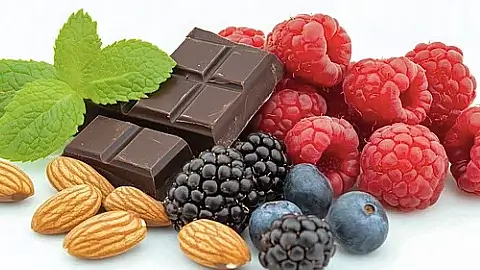The Science Behind Antioxidants and Liver Health

Exploring Antioxidants: Nature's Defense Mechanism
Antioxidants play a pivotal role in maintaining overall health, particularly when it comes to liver function. The liver is constantly exposed to oxidative stress due to its central role in detoxification processes. Oxidative stress, caused by an imbalance between free radicals and antioxidants, can lead to cellular damage and the progression of liver-related conditions. Understanding the science behind antioxidants and liver health underscores their importance in preventive care and therapeutic strategies.
How Oxidative Stress Impacts Liver Health
Oxidative stress arises when there is an overproduction of reactive oxygen species (ROS) that the body cannot adequately neutralize. The liver, as the body’s detoxification hub, generates ROS during the metabolism of alcohol, medications, and other toxins. If left unchecked, these ROS can damage liver cells, leading to conditions such as nonalcoholic fatty liver disease (NAFLD), alcoholic liver disease (ALD), and even cirrhosis.
Studies have shown that oxidative stress exacerbates inflammatory pathways, accelerating the progression of liver fibrosis. The damage caused by oxidative stress underscores the need for effective antioxidants to counteract ROS and maintain hepatic health.
Antioxidants: Mechanisms of Action
Antioxidants neutralize free radicals by donating an electron, thereby preventing cellular damage. They also regulate signaling pathways and modulate inflammation—two critical functions for liver health. Broadly, antioxidants can be classified into:
- Endogenous Antioxidants: Produced within the body, examples include glutathione, superoxide dismutase (SOD), and catalase. These molecules are the first line of defense against oxidative stress.
- Exogenous Antioxidants: Derived from dietary sources, these include vitamins (e.g., C and E), polyphenols, and carotenoids. Foods rich in these compounds can enhance the body’s antioxidant capacity.
Fundamental Mechanisms of Hepatic Oxidative Stress
The liver's metabolic activities generate significant quantities of ROS as byproducts. These molecules can accumulate to harmful levels if not adequately neutralized. Under normal conditions, the liver maintains a delicate balance between pro-oxidant and antioxidant systems. Key enzymatic antioxidants include:
- Superoxide Dismutase (SOD): Converts superoxide radicals into hydrogen peroxide.
- Catalase: Breaks down hydrogen peroxide into water and oxygen.
- Glutathione Peroxidase (GPx): Works with glutathione to neutralize peroxides.
Top Dietary Antioxidants Supporting Liver Function
- Glutathione Precursors: Critical for synthesizing glutathione from amino acids like cysteine.
- Vitamin E: Protects cell membranes from oxidative damage.
- Vitamin C: Scavenges ROS and regenerates other antioxidants.
- Polyphenols: Found in green tea and berries; they exhibit antioxidant properties.
- Selenium: Integral for antioxidant enzyme function.
- Beta-Carotene: Prevents lipid peroxidation in liver cells.
- Curcumin: Modulates oxidative stress and inflammation; activates Nrf2 pathways enhancing antioxidant defenses.
- Resveratrol: Activates antioxidant pathways linked to reduced fat accumulation in the liver.
- Lycopene: Enhances detoxification processes.
- Omega-3 Fatty Acids: Reduce oxidative stress markers.
Evidence-Based Benefits of Antioxidants in Liver Health
Protecting Against NAFLD
Nonalcoholic fatty liver disease is closely associated with oxidative stress and chronic inflammation. Antioxidant supplementation, particularly vitamin E and polyphenols, has been shown to improve liver fat content and reduce inflammation in clinical trials.
Slowing Liver Fibrosis
Fibrosis involves excessive accumulation of extracellular matrix proteins in response to chronic injury. Antioxidants like curcumin and resveratrol interfere with signaling pathways promoting fibrogenesis.
Supporting Liver Regeneration
The liver’s ability to regenerate is unparalleled. Antioxidants facilitate this process by reducing oxidative damage during cell turnover.
Enhancing Detoxification
Antioxidants enhance phase II detoxification pathways, vital for maintaining hepatic resilience against environmental toxins.
Molecular Pathways and Therapeutic Targets
Recent advances have revealed several key pathways through which antioxidants support liver health:
- Nrf2 Activation: This master regulator enhances cellular defense mechanisms by upregulating antioxidant response elements and detoxifying enzymes.
- Inflammatory Cascade Modulation: Reduces pro-inflammatory cytokine production, decreasing neutrophil infiltration.
Incorporating Antioxidants into Clinical Practice
Dietary Recommendations
Encouraging a diet rich in antioxidant-dense foods significantly impacts liver health. A Mediterranean-style diet aligns well with these recommendations.
Supplementation Strategies
For patients unable to meet their antioxidant needs through diet alone, targeted supplementation—under medical supervision—may be beneficial.
Monitoring and Evaluation
Clinicians should monitor liver enzyme levels and oxidative stress markers to evaluate the effectiveness of antioxidant interventions.
Conclusion
The science behind antioxidants and liver health reveals their indispensable role in combating oxidative stress and supporting hepatic function through various molecular mechanisms like Nrf2 activation. By incorporating antioxidant-rich foods and supplements into dietary plans, individuals can enhance liver resilience and reduce the risk of chronic liver conditions. This revised article integrates detailed molecular mechanisms from the second article while retaining practical dietary advice from the first article, providing a comprehensive overview suitable for both general readers and those interested in deeper scientific insights.
Share this article

Dr. Paul Martin Gacrama, MD
Dr. Gacrama is a Board-Certified Internist specializing in Internal Medicine and Adult Gastroenterology. See Full Bio.
-
1. Sanyal AJ, Friedman SL, McCullough AJ, et al. Current and novel therapeutic targets in NAFLD. Nat Rev Gastroenterol Hepatol, 2021.
-
2. Dharmalingam M, Yamasandhi PG. Nonalcoholic fatty liver disease: A review. J Clin Transl Hepatol, 2020.
-
3. Zhang Y, Xiang D, Hu X, Ruan G, Wang X, et al. Identification and characterization of a novel Nrf2 inducer designed to target the liver-specific toxicity of acetaminophen. J Hepatol, 2023.
-
4. Cichoż-Lach H, Michalak A. Oxidative stress as a crucial factor in liver diseases. World J Gastroenterol, 2022.
-
5. Marrone G, Maeso-Díaz R, García-Cardena G, Abraldes JG, García-Pagán JC, Bosch J, Gracia-Sancho J. The endothelium in the liver: a central role in health and disease. Nat Rev Gastroenterol Hepatol, 2021.
-
6. Buzzetti E, Pinzani M, Tsochatzis EA. The multiple-hit pathogenesis of non-alcoholic fatty liver disease (NAFLD). Metabolism, 2022.
-
7. Toledo FD, Pérez LM, Basiglio CL, Ochoa JE, Sanchez Pozzi EJ, Roma MG. The role of oxidative stress in cholestatic liver injury. Liver Int, 2023.
-
8. Wang K, Chen X, Ward SC, Liu Y, Ouedraogo Y, Xu C, et al. A liver-targeted Nrf2 agonist protects against hepatotoxicity and metabolic dysregulation. Nat Commun, 2021.
How an Antioxidant-Rich Diet Can Support Liver Function The liver, a vital organ responsible for detoxification, metabolism, and nutrient storage, plays a...
What Is NAFLD? Non-alcoholic fatty liver disease (NAFLD) is a condition characterized by the accumulation of fat in the liver, independent of significant alcohol...
Ideal Body Weight Calculator Achieving and maintaining an ideal body weight is essential for overall health, and it becomes even more critical for individuals...

You might enjoy more articles by
Dr. Paul Martin Gacrama, MD
 Disease
Disease Diets
Diets Recipes
Recipes Supplements
Supplements Management
Management Calculators
Calculators Quizzes
Quizzes Glossary
Glossary
























